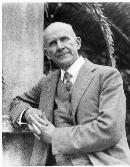Skip to: site menu | section menu | main content
Welcome To Democracy And Socialism .Com
Things should be made as simple as possible, but not any simpler- Albert Einstein
Eugene Victor Debs (1855- 1926) |
 |
Eugene V. Debs was a great revolutionary, socialist, anti-war activist, anti-racist campaigner, admirable orator and writer of the 20th century America. Implications of his many ideas undoubtedly have positive effects in the daily lives of all ordinary Americans.
Debs was born in Terre Haute, Indiana in a relatively prosperous French immigrant family, and named after two 19 century French socialist writers, Eugene Sue, and Victor Hugo. Raising in a socially conscious family caused him to go and experience by himself the plight of the workers and poor families in the U.S. society.
Thus he left school at the age of 17 to work on the railroads. 3 years later in 1875, as a socially active young person, he became a founder of a new lodge of the Brotherhood of Locomotive Firemen. In 1880, he became the Brotherhood’s Grand Secretary and the editor of its magazine.
In 1884, Debs was elected to the Indiana state legislature as a Democrat. One year later at the age of 30, he married to Kate Metzel, his lifelong wife and companion whom he loved and cared for until his death. They had no children.
During the course of his struggles, Debs realized the need for a more challenging union, to focus mostly on collective bargaining than merely fulfilling the individual demands of its members. In 1893, after quitting the BLF, he organized one of the first industrial unions in the United States, the American Railway Union.
In 1894, about 12,000 U.S. Army and a big number of U.S. Marshals were sent to crash what was called the Pullman Strike. Debs along with his fellow union leaders of ARU, were arrested and convicted. Debs spent 6 months in prison. At the time of his release thousands of workers came to greet him.
In jail he studied the works of Karl Marx and Frederic Engels, and came to believe in Scientific Socialism. In 1897, Debs joined with Ella Reeve Bloor and others to form the Social Democratic Party. In 1900, he was the party’s presidential candidate. In 1901, he participated in the foundation of the Socialist Party of America and became its candidate for US president in 1904, 1908, 1912, and from behind bars in 1920.
Debs was largely pessimistic about the whole electoral process in the U.S., and believed that the working class has to organize, educate, and liberate itself by itself. His unwavering commitment to the cause of workers led him to be one of the founders of the Industrial Workers of the World union in 1905.
Between 1907 to1912, Debs was the Associate Editor of the Appeal to Reason. This weekly magazine achieved a circulation of several hundred thousands due to the energetic and convincing writings of Debs.
With the start of World War I, Debs denounced this killing machine as an inter-imperialist war with the purpose to reshape their spheres of influence. He made several famous speeches against the war and the U.S. participation in that war. The U.S. government fearing a backlash among the American public, delayed Debs arrest until the Allied victory was assured. Finally Debs was arrested for delivering an anti-war speech in Canton, Ohio in June 1918 and violating the Espionage Act. Anybody who was against the war was considered as an enemy spy. Debs was sentenced to 10 years in prison, disenfranchised for life and lost his citizenship.
It was in this prison term, that he ran for the U.S. presidency of 1920, and received 919,799 votes. This big support caused President Warren G. Harding, to release him from prison in 1921, commuting his term to time served.
Debs health was severely damaged by his imprisonment; he died on October 20, 1926, in Lindlahr sanitarium, Elmhurst, Illinois. On that day the world lost one of its prominent citizens. Debs was one of the founders of the International Labor Union, and wrote hundreds of articles mostly dealing with the cause of workers, poor people and their struggle for establishing socialism.